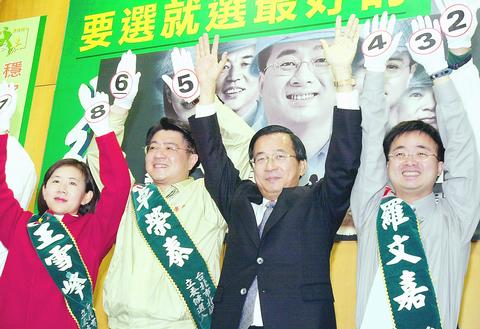President Chen Shui-bian (
The DPP's vote-allocation system, which aims to spread votes evenly between candidates and therefore maximize the number of seats won, involves requesting supporters to vote for specific candidates in multi-member constituencies in a methodical way.
Vote-allocation systems have proved effective for both the DPP and the New Party in past legislative elections.

PHOTO: CHIANG YING-YING, TAIPEI TIMES
Vote allocation requires candidates to avoid emphasizing themselves over other candidates from their party and asks voters to ignore their personal preferences for any candidate but the party's designee.
Chen attended a press conference held by his former aide, Lo Wen-chia (
"I appreciate all of my supporters, but I would like to appeal to them to vote for the candidates they are assigned to vote for," Lo said.
The DPP nominated five candidates in each of Taipei's two constituencies this year, but the party started worrying about whether the 10 can all be elected since polls have shown that only five to seven candidates are receiving enough support to get elected.
Chen, however, believes that vote-allocation will make a difference.
"The DPP has a stable constituency in Taipei. If we practice vote-allocation correctly, the 10 nominees in Taipei City will all be elected," Chen said at the press conference.
The DPP officially announced the vote-allocation policy in Taipei's two constituencies on Nov. 13, followed by the same announcement in other areas of the country. The policy, though, has caused disputes between the party's nominees, because most of them are afraid that distributing votes to other candidates would result in a loss for themselves.
"I am afraid I will not receive enough votes to win the election. How can I allocate my support to other candidates?" said Mark Chen (
In a reaction to arguments from the party's candidates, DPP secretary-general Wu Nai-jen (
"The DPP's supporters would like to see the party win the majority," Wu said.

MAKING WAVES: China’s maritime militia could become a nontraditional threat in war, clogging up shipping lanes to prevent US or Japanese intervention, a report said About 1,900 Chinese ships flying flags of convenience and fishing vessels that participated in China’s military exercises around Taiwan last month and in January last year have been listed for monitoring, Coast Guard Administration (CGA) Deputy Director-General Hsieh Ching-chin (謝慶欽) said yesterday. Following amendments to the Commercial Port Act (商港法) and the Law of Ships (船舶法) last month, the CGA can designate possible berthing areas or deny ports of call for vessels suspected of loitering around areas where undersea cables can be accessed, Oceans Affairs Council Minister Kuan Bi-ling (管碧玲) said. The list of suspected ships, originally 300, had risen to about

DAREDEVIL: Honnold said it had always been a dream of his to climb Taipei 101, while a Netflix producer said the skyscraper was ‘a real icon of this country’ US climber Alex Honnold yesterday took on Taiwan’s tallest building, becoming the first person to scale Taipei 101 without a rope, harness or safety net. Hundreds of spectators gathered at the base of the 101-story skyscraper to watch Honnold, 40, embark on his daredevil feat, which was also broadcast live on Netflix. Dressed in a red T-shirt and yellow custom-made climbing shoes, Honnold swiftly moved up the southeast face of the glass and steel building. At one point, he stepped onto a platform midway up to wave down at fans and onlookers who were taking photos. People watching from inside

Japan’s strategic alliance with the US would collapse if Tokyo were to turn away from a conflict in Taiwan, Japanese Prime Minister Sanae Takaichi said yesterday, but distanced herself from previous comments that suggested a possible military response in such an event. Takaichi expressed her latest views on a nationally broadcast TV program late on Monday, where an opposition party leader criticized her for igniting tensions with China with the earlier remarks. Ties between Japan and China have sunk to the worst level in years after Takaichi said in November that a hypothetical Chinese attack on Taiwan could bring about a Japanese

The WHO ignored early COVID-19 warnings from Taiwan, US Deputy Secretary of Health and Human Services Jim O’Neill said on Friday, as part of justification for Washington withdrawing from the global health body. US Secretary of State Marco Rubio on Thursday said that the US was pulling out of the UN agency, as it failed to fulfill its responsibilities during the COVID-19 pandemic. The WHO “ignored early COVID warnings from Taiwan in 2019 by pretending Taiwan did not exist, O’Neill wrote on X on Friday, Taiwan time. “It ignored rigorous science and promoted lockdowns.” The US will “continue international coordination on infectious